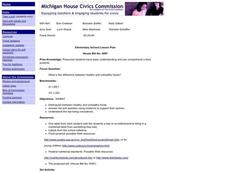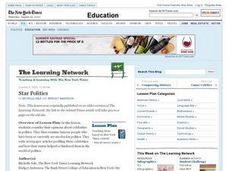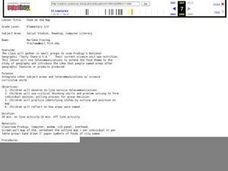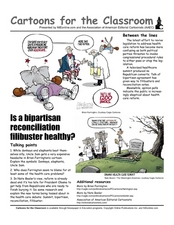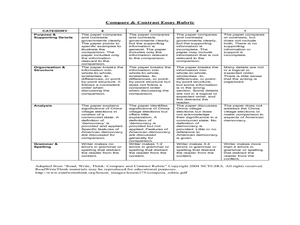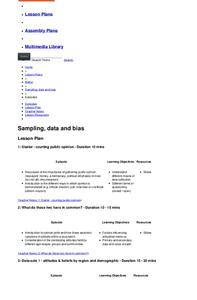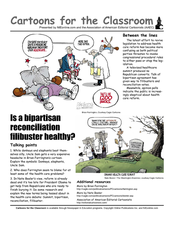ProCon
Right to Health Care
Is health care a right or a privilege? Scholars review pro and con arguments to decide if all Americans should have the right to health care. They also watch informative videos and review information on the United States and...
Curated OER
Campaign Hot Buttons
High schoolers participate in a simulation that asks them to work as staffers for a candidate running for office. They are assigned to design, administer, and analyze a simple poll on an important community issue. Students develop a...
ProCon
Social Media
Facebook, Instagram, Twitter—are they good for society? Pupils prepare for a class debate in which they voice their opinions on the issue. They read the main pro and con arguments, explore others' opinions, view videos, and discover the...
Curated OER
House Bill No. 4097
Students identify healthy and unhealthy foods while considering a bill that would ban certain foods in schools. Through survey and discussion, they discuss a proposed legislative bill that would ban certain types of food in schools....
Curated OER
Parental Accountability and Public Policy
Students investigate parental responsibility for the actions of their Students. They compare the responsibility in the State of Washington and the rest of the country.
Curated OER
Law & Ethics for Photojournalists
Students identify and discuss First Amendment rights, examine how to make sound legal judgements regarding photographs of private individuals, examine difference between public and private figures as far as libel law is concerned,...
ProCon
Is Homework Beneficial?
Does homework improve student achievement, or does it increase stress? Scholars use the included debate topics website to prepare for a class discussion or debate about whether homework is advantageous. After reading a brief background...
Curated OER
Star Politics
Students discuss the advantages of a celebrity running for a public office. After reading an article, they examine the results of the California governor recall vote. In groups, they research the aspirations and career of a celebrity...
Curated OER
Designing Samples/Simple Random Samples
Students explore the concept of sampling techniques. In this sampling techniques lesson plan, students identify possible sources of bias in situations such as phone polls, supermarket surveys, and drawing names from a phone book....
Curated OER
Cartoons for the Classroom: Differing Ideas Frame a Debate
In this current events worksheet, students analyze a political cartoon about the SCHIP Bill and respond to 3 talking point questions.
Curated OER
Housing Law
High schoolers learn of the housing law and express their opinions about it.
Curated OER
What Is Hot?
Learners explore why: Schools are hotbeds of popular young opinion about what to wear, which music to listen to, and what TV shows to watch. In this activity, students extend their fascination with "what's hot" to the books they read by...
Curated OER
Opening a Restaurant
Young scholars design a survey of the public as to what type of food should be served in restaurant that they are "planning" to open.
Curated OER
Food on the Map
Students work together to examine the tastiest towns in the United States. After discovering the names of the equipment, they identify the seven continents. They take a survey and locate the cities and states of the foods mentioned.
Curated OER
"Bill's Run" Lesson Plan: What Do People Want from Politicians?:
Learners evaluate various methods of sampling opinions, consider the role of polling in elections, and consider the role of media reporting in the outcome of elections. They also gain skills they can use to analyze and evaluate media...
Curated OER
Are Gay Rights "Special"?
Inspire critical thinking with this activity, which prompts students to compare lesbian, gat, bisexual, and transgender rights with the rights guaranteed by the Universal Declaration of Human Rights. By collecting topical articles about...
Curated OER
Let's Debate - Demonstrating Effective Communication Skills
Students explore and engage in the art of debate. When both sides have been presented each pair have a few minutes to prepare a rebuttal based upon what the opposing side has said. A rubric imbedded in this plan is used as an assessment...
Curated OER
Environmental Agents of Mathematics: Mathematics for Change
High schoolers analyze environmental science data using Math. They do research about renewable energy, gather data, create graphs and interpret their findings. Then the group presents their arguments persuasively using their findings to...
Curated OER
Cartoons for the Classroom: Bipartisan Filibusters
There is no doubt many changes or lack of changes are due to bipartisanism in the capital. Learners analyze a political cartoon that describes the issues surrounding changes to the current health care system, and consider whether...
Curated OER
One Survivor Remembers: Anti-Semitism
Learners analyze and discuss how propaganda influenced anti-Semitism and it's role in World War II. In this propaganda lesson, students define the terms involved in this assignment. Then they will discuss their reactions to a film and...
Curated OER
Identifying Propaganda Techniques
In this propaganda techniques worksheet, learners write the technique next to the sentence read by a candidate. Students complete 12 problems.
Curated OER
Democratic Village Elections in China: Comparing Governments of China and the United States
High schoolers explore democratic practices in China. In this global studies lesson, students compare and contrast democratic values of the Chinese government with the American government. High schoolers read provided articles and...
Curated OER
Maps
Students investigate threee types of maps. In this algebra lesson, students idenitfy different maps and explore how they relate to the area keeping cllimate and topography in mind. They discuss maps used to navigate land. air and sea.
Curated OER
Cartoons for the Classroom: Bipartisan Reconciliation
In this current events worksheet, students analyze a political cartoon about bipartisan reconciliation in America and respond to 3 talking point questions.





